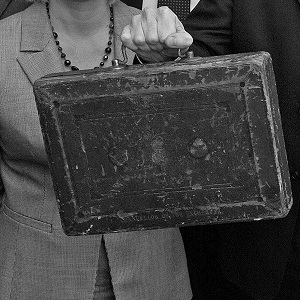Credibility regained: why the party needs to pick a shadow chancellor
In the immediate aftermath of Labour’s painful election defeat, every different colour of the progressive left emerged to give its view as to why Labour lost. Each particular brand of progressivism was able to show that – lo and behold...
In the immediate aftermath of Labour’s painful election defeat, every different colour of the progressive left emerged to give its view as to why Labour lost. Each particular brand of progressivism was able to show that – lo and behold – the data proved that a desertion from their particular creed is what lost us the election.
As the dust begins to settle, there is probably a bit of truth in every critique – whether that be lack of clarity about what the party now stands for or not having a decent pitch to aspiration and to middle England.
A particularly stubborn strand of the post-election debate is whether Labour did or did not spend too much in the years before 2007. A subsidiary of this question is whether we should apologise for it in any case, whatever the truth might be. In terms of the facts a paper I co-authored with Professor John van Reenen of the LSE in 2011 still reads pretty well. “In retrospect, it is clear that public debt levels were too high for the stage of the cycle in 2008 in the UK (alongside many other countries like the US, Ireland and Spain)” but that “the poor state of the public finances was a consequence of the recession, not a cause of it.”
But arguing endlessly with the public about what went right or wrong in the run up to 2007 will never get us anywhere, as our history clearly tells us. Most analysis of the Labour government of 1974-79 suggests that it did not do too badly relative to other western countries over this period. But in the immediate years after 1979, that simply cut no ice with an electorate who were sure that the high inflation, unburied bodies and rubbish piling up in Trafalgar square told the true and whole story. Depressing as it might be for those who gave it our all in government between 1997 and 2010, it is hard to believe that the public, who had to suffer the consequences of the Great Recession, will ever be prepared to agree that the Blair/Brown Labour government did not in some way cause it.
There is also psychology to deal with here. From the minute we lost in 2010, the chances were we would lose the next election. It is hard to imagine that after kicking a party out after 13 years in office the public will forgive you that quickly and vote you back in. And this is even more inevitable given your new leaders are bound to be figures from the previous regime (something that affected the Tories post 1997 as well). So we may as well stop beating ourselves up about the past and try to learn some lessons from it that help us win in the future.
I was working on the economics side for the Labour party and front bench in the 3 years running up to 1992, having left the Treasury at the end of 1988. There are many theories about that loss, but for me the key was that if you are not quite trusted on the economy, then you are not going to win. When they come to cast their vote people metaphorically think about passing over their wallet to you and how they feel about that. The first question in their mind is do they trust you not to lose the money, not to waste a great deal of it and to only spend the minimum you need? The second is do they think you will spend in the way they would want you to and in line with their priorities and values? In 1992, despite a lot of progress since 1987, we failed both tests.
After 1992 there had to be a long, slow slog to gain that credibility on both these factors. The first – trust in your economic competence – was the most important. Of course the exit from the ERM and the inept way that the chancellor Norman Lamont (aided by special adviser David Cameron) handled it, helped an awful lot. But so too did a hard and dogged pursuit of an approach that set a tone and laid out – over a prolonged period – a set of serious and symbolic policies that made people realise that Labour really cared about how to run an economy. An approach that was pro-business and positively relished the idea of wealth creation as much as it did spending the proceeds of that growth. It was not an easy path and shadow chancellor Brown lost a lot of his popularity amongst party activists during this period for keeping to it.
Harder still in this period, especially for many left economists, was a desertion of overt Keynesianism. A narrative of boosting demand in the economy to achieve growth and consequently reduce the deficit and debt was ditched in favour of what I have called ‘supply side Keynesianism’. This shift to focus on stability and investing in things that boost the supply side of the economy and make us more productive – like upskilling the workforce and getting more research into new products – had to be done for both political and economic reasons. As one who in 1983, 1987 and 1992 tried to explain crude demand Keynesianism on the doorstep I can assure you that it is a very hard ask indeed.
All of this can’t just be pushed by one or two people in the party or the public will see straight through you. The whole party has to get behind it. Sure, after 1992 the lead was taken by Gordon Brown, but the whole party became not only disciplined but focused. It became clear that the bulk of the Labour party really meant it when they said you could not let borrowing get too high, not just that they thought they had to say it to get re-elected.
Getting the centre-left to really focus on economics is never easy. We are far more comfortable spending public money to solve the problems of the world and debating new forms of capitalism than getting down to the hard graft of micro economic policy that improves outcomes and macroeconomic policy that works in the modern world. But supply side Keynesianism does provide a place most of the party is comfortable, where we focus on the need to invest in infrastructure and public services to get the supply side really humming. This was essentially the Labour policy after 1992. It is also extremely relevant today because it is an answer to the crucial issue of productivity and its stagnation and also to the underlying problems of the economy that are glaring at us if we look beneath the bonnet.
Such an agenda allows us to link an economic policy that makes sense to the public with our desire to create social justice in a way that more than the bottom few deciles can relate to. It means less of a rather abstract call for more investment in infrastructure and more of a focus on things that mean something to a typical voter, be that their trains, buses, schools, roads, houses, or hospitals. Indeed we have had too little focus in recent years on how we are going to make public services work for the public and invest in them to underpin growth. Instead we have been diverted into electorally marginal byways like debating how we feel about the involvement of particular forms of private activity in these areas.
So the lesson from 1992 is not so much that we should search for a transformational, symbolic policy or a particular time path for deficit reduction. It is that the context, the
tone, the mood we set around our approach to economic policy have to be right and have to be genuine, with the party fully behind it. So as Labour’s contests for leader and deputy leader get into full swing, it is worth pointing out that getting the right shadow chancellor is just as important as getting the right leader. It certainly far more important than the deputy leader. Potential leaders should therefore stand on a ticket with their shadow chancellors, so we get a proper a look at the party’s economic future and make sure the approach we take to the economy is front and centre of the debate.
So as we look forward, we have to get balance right. We should ignore some apocalyptic talk about the Labour party being finished and treat with suspicion those who preach very simple answers like just getting a leader that ‘connects’ a bit more. Cracking the economic side of all this is key to our come back and it is not a quick fix.
Doom is neigh at present on the left: demographics, Scots, the white working class, cosmopolitans and London, UKIP and so on. It is a familiar fatalism from previous times we have been knocked out. But the lessons from the past are not of doom and gloom but of hard work to establish economic competence once again.

